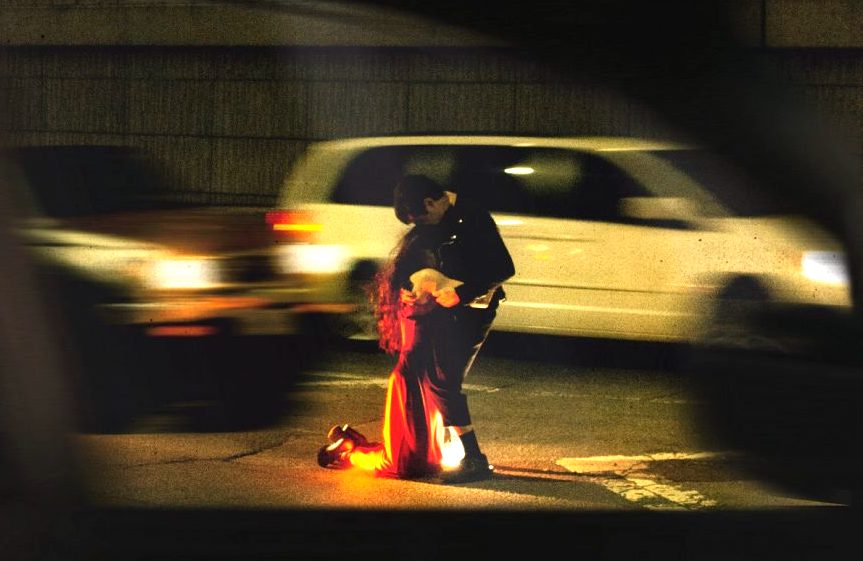Heaven Come Crashing is Brooklyn-based Rachika Nayar’s second full-length album, following 2021’s Our Hands Against the Dusk, which garnered positive reviews in Bandcamp Daily and Popmatters with its deeply felt ambient-electronic soundscape.
Fans of her debut will find much to recognize in Heaven Come Crashing—a haunted atmosphere carries over from her debut into several of these new songs, as does twinkly, melancholic guitar playing. Heaven Come Crashing also demonstrates Nayar’s versatility and creative evolution by clearly distinguishing itself from her earlier oeuvre. For one, the album places a lot more emphasis on layering and building upward, with guitars, synths and drum tracks looped and grown until they form veritable fortresses. Beyond the recognizably ethereal sound textures, there’s a lot more diversity of both effective experience and sound. Several unexpected moments catching the listener off-guard—in a positive way.
Though Heaven Come Crashing showcases Nayar’s continued affinity with ambient and left-field electronic music, it has some surprising resonations. Parts of the album are reminiscent of early post-rock bands like Tortoise and Do Make Say Think, or even with the languid chiptune soundtracks of some existentially minded video games. Nayar is clearly aiming for the cinematic on this LP, working for an epic maximalism that brings to mind a film’s rolling credits and sickly sweet interpersonal melodrama. The song names reaffirm this linkage with the melodramatic—“Nausea,” “Sleepless” and “Death & Limerence.” The name of the album itself reads as though it could be a long-running soap opera. Listeners looking for concrete meaning in these titles, or in the songs themselves, will have to drum up their own—Nayar tends toward the enigmatic, and shies away from telling listeners how her songs should be interpreted.
Heaven Come Crashing’s opening track, the similarly poetically named “Our Wretched Fantasy,” is one of the strongest songs on the album. It guides the listener through a series of emotions as though pulling them through rooms in a house. The whirling intro has reverb effects wailing like ghosts, rubbing up against a bright, snappy synth until suddenly the song shifts into another territory, with a neater melody made up of optimistic synths popping against melancholic sliding or strumming guitars. This is one of the songs that truly feels like a soundtrack for a side-scrolling video game where a protagonist explores a castle filled with equal parts ghosts and happy memories. It carries a certain nostalgia, one that’s been allowed to blossom into a mature form, but still carries a sappy sweetness within it. Toward the end of the song, atmospheric, breathy effects build up like a curtain drawing over the music, before quieting into whispers. “Our Wretched Fantasy” skillfully sets the tone of the album, packed full of different sounds, feelings and atmospheres without ever feeling bloated or trite.
Other highlights on the record include the two collaborations with singer-songwriter Maria BC, whose haunted, yearning-filled vocals brilliantly match the atmosphere of Nayar’s instrumentals. The California-based artist is featured on the title track as well as on the album’s closer, “Our Wretched Fate.” Both songs are album highlights, with the two musicians bringing out the best in each other’s abilities. “Heaven Come Crashing” begins with BC’s typically ethereal vocals layering over themselves in a just-off way, obscuring the lyrical meaning and drawing your attention instead to the atmosphere and instrumentality of the voice. Whirling synths suddenly wash away the listener like a high-tide wave, just before a wholly unexpected explosion into a rhythm that could be described as nearly breakbeat: sharp, cracking hi-hats and snares speeding at a pace that feels enjoyably dangerous. The song reaches a euphoric and replete height that’s a pure dose of dopamine, and that is probably the best moment on the whole album.
On “Our Wretched Fate,” titled like an enlightenment-era philosophical treatise exploring the roots of human suffering, the musical chemistry between these two artists again shines through. The song builds to a desperate, pummelling wall of sound mobilized by quick, sharp snares, all against BC’s swirling vocals that sound injected with mournful yearning. It’s a perfect choice for a closer. The epic, emotionally high-stakes sensibility leaves a lasting impression.
“Nausea” is another highlight of the album, beginning in a more trepidatious fashion with ominous crunching waves paired with a chirpy, nearly circus-like effect moving in dizzying circles. These sounds are contrasted with a large, pounding bass used sparingly to build an atmosphere that’s viscerally ancient and powerful. As the song progresses, the atmosphere is broken through by a fluid, warbly wind-through-trees effect that transitions into a segment that’s brighter and more hopeful, almost answering the ominous, dread-filled energy of the intro. The song builds to a massive, cinematic, flourishing finish created using thick, wailing synths and a racing snare roll—another pleasure-filled height that’ll stop you right in your tracks.
When the album hits, it hits hard, with strong moments of dread and melancholy as well as powerful euphoria, but the record doesn’t hit all the way through. Some moments are bogged down by a sense of being limply exploratory and roughly sketched. “Tetramorph,” the longest song on the album, has many interesting sounds and textures within it, but its sprawling length isn’t used to its full potential. The song’s middle section has a moment that hints at greatness, but is held back from actually grasping it, stymieing the possibility of a euphoric break by instead collapsing the song into another looping, layering guitar melody. The song “Gayatri” —named after a thousands-of-years-old Sanskrit manta that’s meant to clear darkness and bring forth light—is similarly held back from its potential. It’s full of curiosity and wonder, but it doesn’t really go anywhere; some of the guitar parts feel noodle-y rather than purposeful.
At just 10 songs, the album isn’t very long, and such brevity doesn’t leave space for filler. Nonetheless, two of its tracks—“Promises” and “Sleepless”—feel like brief hints at concepts rather than fully fleshed-out products. They might be meant to be taken as interludes, short breaks in between larger, grander songs; but if that’s the case, they don’t sufficiently distinguish themselves either in sound or in effect from the rest of the album. “Promises” clocks in at a short two minutes, and doesn’t have any real builds, crashes or transitions; it simply repeats another dreamy, melancholy melody against layers of sound. It’s beautiful, and it could be transportive if it had more substance and wasn’t so flatly repetitive. Similarly, the track “Sleepless” doesn’t deviate much from the same guitar loop throughout its relatively short duration. Neither song leaves any sort of an impression on the listener, feeling flaccid and a bit monotonous between such great heights like “Nausea” and the title track.
Though a tad uneven and at times experimental and explorative to a fault, Heaven Come Crashing nonetheless affirms Rachika Nayar as a creative force to reckon with. The heights on the album, surprising and emotional, demonstrate Nayar’s versatile influences as well as her skill at infusing her music with a melodrama that’s sincere and heartfelt. With her second full-length, Nayar showcases a continued musical evolution that makes one excited to see what she brings to the table next.
Heaven Come Crashing is out on NNA Tapes August 26.


 Why you can trust Xtra
Why you can trust Xtra


